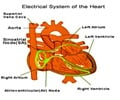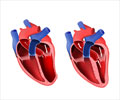Researchers have discovered a protein called B1N1 that is necessary for the heart muscle to contract.
Researchers have discovered a protein called B1N1 that is necessary for the heart muscle to contract.
The finding, published in the Feb. 16 issue of the open access journal PLoS Biology, shed light not only on what makes a heart beat but also on heart failure, a disease where cardiac cells are no longer able to contract and pump blood through the body."In all of us, a heart beat occurs about once every second. For each successful heart beat, millions of individual heart muscle cells perform their own microscopic contractions, so the biology of normal heart function is based on the workings of individual heart cells. There is now less mystery to how each heart cell organizes itself to contract," said Robin Shaw, MD, PhD, an author of the study and a cardiologist in UCSF's Heart Failure and Transplantation Service.
Each contraction of a heart cell depends on tiny calcium channels in specialized pockets of membrane known as T-tubules. Correct positioning of these channels on the T-tubules is essential. Scientists have known for decades why the channels need to be on T-tubules, but were perplexed how they got there.
Ting-Ting Hong, MD, PhD, lead author and postdoctoral fellow in the Shaw Laboratory at UCSF, had a mental image of calcium channels being carried on highways (known as microtubules) directly to membrane docking stations in the T-tubules. Hong confirmed her hypothesis of directed delivery of the channels and identified the protein docking station as BIN1.
The study involved human heart cells and non-muscle cells that allowed researchers to recreate the delivery process using only the highways, channels and docking station. When the team mutated the docking station (BIN1), they confirmed that, like in heart failure, the cascade of signaling events necessary for heart contraction become dysfunctional.
Understanding how the heart cell organizes itself paves the way for investigators to understand what happens to the heart during heart failure.
Advertisement
Source-ANI
TRI















